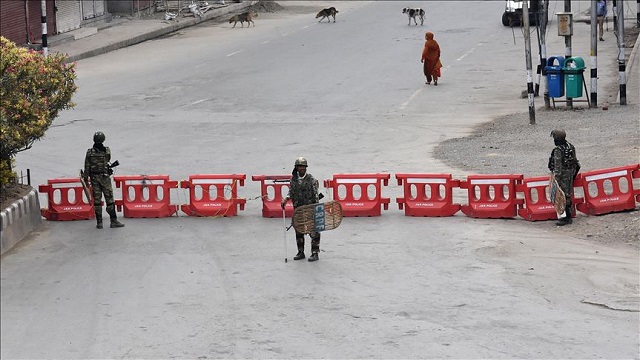
The reason I quote this incident is that we have a general tendency to remember the effect but a very short memory to relate the cause. The moral of the story is that if we can rein in the Faidas we may never have the Bouazizis. This stands true for all the human accesses, undue killings, mass slaughters and genocides. The world wakes up late and is always firefighting to control the effects whereas the symptoms and the causes are always there for it to preempt and prevent. The curfew in Kashmir has entered its 19th day and all we hear so far are reassurances by a world which remains in a “reassuring mode” as world leaders make statements of “keeping a close watch of the developing situation”.
The world again waits for a Bouazizi to wake up its conscience. The situation in Kashmir is growing critical by the day. Pakistan has repeatedly reminded the world about the possibility of India carrying out a false flag operation inside IoK and blame Pakistan for masterminding it. The security situation along the LoC and in the region of Kashmir warrants an immediate attention and the world needs to remove its marathon boots and put on its sprinting shoes to address the fast deteriorating situation before it’s too late.
The Indian Prime Minister is in France. India has purchased 36 Rafael fighter jets from France at the cost of $9 billion. The closed door huddle that took place at the UN Headquarters in New York was not followed by a statement to the press because France, besides USA and Germany, considered that the language might broaden the issue beyond the possibility of a future India-Pakistan bilateral dialogue. The great loss to India was Russia’s stance but it now looks like India will gradually make a shift and rely more on a “France veto power” instead of Russia. India has put in enough economic and political work to “buy the silence of the world”. It’s not only France that has termed Kashmir a bilateral issue but Muslim countries like Bangladesh, whose political and economic interests are aligned with India, are also speaking the same language. Considered as a “Superpower in waiting”, India tends to get favourable responses from states that hope to partner with it in the future. President Trump’s stand on Kashmir and his repeated offers for mediation can also be attributed to economic reasons.
Robert D BlackWill and Ashley J Tellis in their article “The India Dividend” in the September issue of Foreign Affairs write, “Critics carp that the United States has overinvested in India and the favours accorded to New Delhi have not been worth the return.” They point to India’s failure to select a US fighter for its air force and also its inability to conclude the nuclear reactor purchases promised under the breakthrough nuclear agreement. Although India increased its defence acquisitions from the US from zero to $18 billion in 2018, it still did not cut its linkage with the main supplier of its defence equipment, Russia.
In October 2018, India announced to purchase S-400 air defence systems from Russia at a cost of $6 billion. The open markets and the trade space that India offers is a carrot the world finds very difficult not to eat. Thus India, instead of being whipped by the world for committing gross human rights violations, earns on the matter of Kashmir via delays, postponement of attention and procrastination. The result is that India seemingly remains under pressure but never appears to be panicking or planning to change what and how it has indulged in Kashmir.
The one question that people repeatedly ask today is, “Would there be a war due to the current situation in Kashmir?” We know that according to the raw military metrics, we are weaker than India. The question is not whether India and Pakistan would go to war. The real question is: Would the nuclear deterrence, which has stood the test of time since World War II, actually fail? It is hard to imagine India would initiate an all-out war against Pakistan. Even a surprise attack against Pakistan in AJK is a remote possibility for the fear of retaliation — the taste of which it already had a few months ago. Yes, it will continue to carry out smaller tests of Pakistan’s resolve in the form of ceasefire violations, executing false flag military operations in its own territory and accusing Pakistan of sending infiltrators and militants across the border. All this will be to promote its narrative of executing strong defensive measures against an insurgency that is being planned, executed and driven from across the border.
Three important factors will stand out to determine the final solution of the Kashmir issue. Firstly, time — the longer the world takes to react the greater opportunity India gets to gain its stranglehold over Kashmir. The confinement of people in West Bank and Gaza, the building of the concrete security wall and the construction of the Israeli settlements all came about when the world eventually became insensitive to Israel’s repeated killings and atrocities in Palestine. Secondly, the attitude of the permanent members of the UN Security Council matters. If they cannot see beyond their selfish economic noses, the resolutions on Kashmir will remain buried in the dusted files in the UN Headquarters. Lastly, when nothing works out and the world remains as insensitive as it is, the people of Kashmir must know that in this obtuse and indifferent world, the only thing that leads is what bleeds. For them, the time for offering sacrifices may still not be over.
Published in The Express Tribune, August 25th, 2019.
Like Opinion & Editorial on Facebook, follow @ETOpEd on Twitter to receive all updates on all our daily pieces.


1729662874-0/One-Direction-(1)1729662874-0-165x106.webp)








COMMENTS
Comments are moderated and generally will be posted if they are on-topic and not abusive.
For more information, please see our Comments FAQ